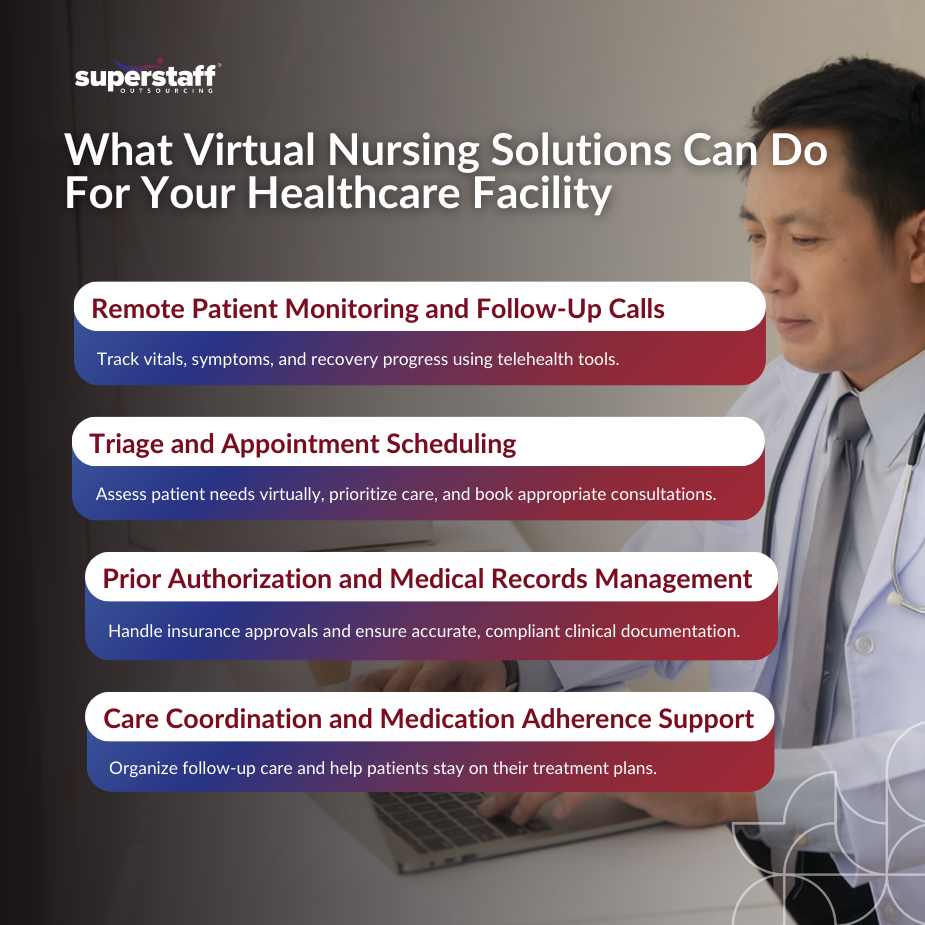
As healthcare goes digital, a new kind of frontline is emerging—not in hospital wards or bustling clinics, but in virtual nursing hubs operating thousands of miles away. These hubs, powered by advanced communication technology and skilled nursing professionals, are redefining how patient care is delivered.
The global healthcare system is under pressure from every angle: staffing shortages are straining already overburdened teams, operational costs continue to climb, and patient demand for timely, virtual care has never been higher. To meet these challenges, forward-thinking healthcare providers are embracing virtual nursing solutions—and increasingly, they are turning to the Philippines as their partner of choice.
In this blog, we’ll explore the rise of virtual nursing hubs in the Philippines, examining how specialty healthcare outsourcing empowers providers to deliver high-quality care remotely. We’ll break down how these solutions work, why the Philippines has become a global leader in this field, and what strategic advantages they offer for healthcare organizations looking to expand capacity, reduce costs, and maintain exceptional patient outcomes.
Why the Demand for Virtual Nursing Is Surging
Virtual nursing has moved from a convenience to a necessity in modern healthcare. Once considered a supplementary service, virtual nursing is now at the core of many health systems’ care delivery models. This surge in demand stems from three converging forces: telehealth adoption, staffing shortages, and the shift toward value-based care.
Chronic Staff Shortages in the U.S. and Other Western Countries
According to the Health Resources and Services Administration (HRSA), the United States faces an estimated shortage of 207,980 full‑time equivalent (FTE) registered nurses by 2037. Sadly, the U.S. isn’t alone in facing critical healthcare worker shortages.
Similar trends are seen in Canada, the UK, and Australia, with aging workforces and burnout driving early retirements. This shortfall leaves healthcare organizations scrambling to cover essential patient care tasks—especially those that don’t require direct physical presence.
Increased Patient Volumes and Virtual Visits Post-Pandemic
The COVID-19 pandemic accelerated telehealth adoption, with virtual visits skyrocketing by over 3,000% in some regions. Even as in-person care has resumed, patients have grown accustomed to the convenience of remote consultations, chronic disease management check-ins, and digital follow-ups.
Push for 24/7 Care Continuity Without Adding Onsite Headcount
Today’s patients expect real-time support, whether it’s 2 p.m. or 2 a.m. Meeting that demand without overburdening in-house staff is a challenge—especially for smaller health systems. That’s where remote triage nurse jobs and 24/7 care teams come into play.
To meet this demand, many providers are turning to a proven outsourcing destination: the Philippines.
Why the Philippines Is a Global Hub for Virtual Nursing Solutions
The Philippines combines clinical talent, cultural compatibility, and advanced tech infrastructure to power virtual nursing at scale. Over the last two decades, the country has emerged as a leader in healthcare outsourcing—building on its strong nursing education system and long-standing reputation in the BPO industry.
High Number of Licensed, English-Speaking Nurses
The Philippines produces more than 80,000 nursing graduates annually, many of whom are licensed and trained in both local and international healthcare protocols. English proficiency is high, ensuring smooth communication with patients and providers in the U.S., UK, Canada, and Australia.
Strong Alignment with U.S. Healthcare Standards and HIPAA Compliance
Filipino nurses are well-versed in U.S. clinical workflows and documentation standards. Many have previous work experience in American hospitals or have undergone specialized training in HIPAA compliance, making them ideal for virtual nursing solutions that handle sensitive patient data.
Established BPO Infrastructure That Supports 24/7 Operations
As one of the top outsourcing destinations globally, the Philippines offers world-class internet connectivity, redundant power systems, and secure data centers. This infrastructure enables Philippines virtual nursing hub for 24/7 patient monitoring to operate without interruption.
Cultural Affinity and Patient-Centric Communication Style
Filipino culture emphasizes compassion, respect, and hospitality—all essential traits for patient-facing roles. This makes nurses from the Philippines not just competent clinically, but also exceptional in building patient trust and rapport.
Let’s take a closer look at what these virtual nursing hubs actually do.

What Virtual Nursing Hubs Can Do for Healthcare Providers
Virtual nursing hubs go beyond basic back-office support—they play a direct role in patient care coordination and delivery. Here are some of the most common functions they perform:
Remote Patient Monitoring and Follow-Up Calls
Using telehealth platforms and wearable devices, nurses track patient vitals, symptoms, and recovery progress in real time. For chronic conditions like diabetes or heart disease, this ensures that any changes are detected early.
Triage and Appointment Scheduling
Remote triage nurse jobs involve assessing patient symptoms virtually, prioritizing care needs, and scheduling appointments with the right specialists. This reduces unnecessary ER visits and improves patient flow.
Prior Authorization and Medical Records Management
Virtual nurses help secure prior authorizations for treatments and manage EHR updates, ensuring clinical documentation is accurate and compliant.
Care Coordination and Medication Adherence Support
From organizing follow-up care to sending medication reminders, virtual nurses ensure patients stay engaged with their treatment plans—improving adherence and outcomes.
Outsourcing these functions doesn’t just ease the workload—it brings measurable performance improvements.
Strategic Benefits of Virtual Nursing Outsourcing
Outsourcing virtual nursing services delivers cost savings, operational agility, and improved patient satisfaction. For many healthcare organizations, these benefits align perfectly with their broader strategic goals.
Reduces Overhead and Staffing Costs by Up to 60%
By choosing to outsource to the Philippines, providers can tap into high-quality nursing talent at a fraction of local hiring costs, without sacrificing care quality.
Frees Up In-House Nurses for Higher-Value Clinical Tasks
Instead of spending hours on administrative work or routine follow-ups, in-house nurses can focus on complex, in-person procedures and direct patient care.
Enables 24/7 Care Continuity
With a Philippines virtual nursing hub for 24/7 patient monitoring, organizations can guarantee around-the-clock coverage without exhausting local teams.
Improves KPIs Like Patient Retention and Response Time
Faster follow-ups, proactive outreach, and better communication directly contribute to higher patient satisfaction and loyalty.
So, how do you know if your organization is ready to tap into this growing resource?
Is Your Healthcare Organization Ready for Virtual Nursing Support?
Before outsourcing, healthcare leaders should assess operational needs and readiness. Here’s a quick checklist:
- Are internal nurses spending time on non-clinical tasks?
- Do patients require more frequent virtual touchpoints than current staff can handle?
- Is your organization struggling to hire or retain nursing talent?
- Are you expanding into telehealth or value-based care models?
If you answered yes to any of these, it may be time to consider virtual nursing solutions as part of your staffing strategy.
If you’re ready, the next step is finding a trusted partner with proven expertise in healthcare outsourcing.
Elevate Virtual Nursing Solutions Through Specialty Healthcare Outsourcing
Virtual nursing hubs in the Philippines are transforming how care is delivered—offering scalable, cost-effective, and clinically meaningful support for healthcare organizations.
With skilled nurses, robust infrastructure, and proven results, the Philippines is leading a new wave of healthcare outsourcing that enhances both patient experience and provider efficiency. By tapping into this resource, organizations can reduce costs, improve outcomes, and ensure 24/7 patient coverage without overburdening local teams.
Want to see how virtual nursing can transform your care delivery model? Contact SuperStaff today to explore customized healthcare outsourcing solutions from the Philippines.






